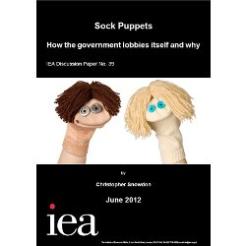Government funding of campaigning charities subverts democracy and debases the concept of charity, according to an explosive new paper published today by right-leaning think-tank the Institute of Economic Affairs.
The report, written by Christopher Snowdon, asserts that by funding charities that seek to influence government policy, the government is effectively lobbying itself as well as lobbying voters. Those charities can then become “sock puppet” versions of civil society organisations that create the illusion of grassroots support for new legislation, he said.
But NCVO chief executive Sir Stuart Etherington has attacked the document as “woefully short-sighted” and ignorant of the way the sector operates.
Snowdon cites charities as diverse as the Fawcett Society, Living Streets, Child Poverty Action Group, War on Want and Oxfam to illustrate the variety of causes espoused by charities that receive significant chunks of their income from statutory sources. There are 27,000 charities in total that now depend on the government for at least three-quarters of their income.
“Government funding of politically active charities, NGOs and pressure groups is objectionable on three counts,” Snowdon wrote in Sock Puppets: How the government lobbies itself and why. “Firstly, it subverts democracy and debases the concept of charity.
“Secondly, it is an unnecessary and wasteful use of taxpayers’ money.
“Thirdly, by funding like-minded organisations and ignoring others, genuine civil society is cold-shouldered in the political process.”
Criticism of Labour government
Snowdon contended that during the Blair-Brown years, public money was directed towards pressure groups which broadly shared the outlook of the Labour Party.
“The government then proposed policies which were controversial with the public but too tame for the activists. These activists then used public consultations, parliamentary briefings and the media to urge politicians to go further, thereby giving the impression of grassroots support for greater intervention, and finally congratulated the government when the legislation was passed in a less compromising form than originally proposed.”
He concluded: “For all their talk of engaging with civil society, it is most unlikely that politicians will fund groups with whom they seriously disagree.
“Realpolitik dictates that you do not finance your enemies. The question is whether it is morally defensible to use public money to finance your friends.”
NCVO: Campaigning is legitimate charity activity
Responding to the report this morning, Sir Stuart Etherington said: “This report is woefully short-sighted and ignores the fact that campaigning is a legitimate activity central to the work of many charities and voluntary organisations, regardless of whether they receive money from the state.
"This activity is also well understood and supported; a recent poll showed that the vast majority of the public think campaigning and lobbying is the most cost-effective activity that charities engage in.
“Far from ‘debasing the concept of charity’, campaigning helps charities to advocate for disenfranchised people, or support and encourage them to speak up for themselves. The independence of the sector is paramount in helping voices to be heard and bringing major social issues to public attention. Who would question the efficacy and need for recent campaigns such as the London Living Wage Campaign and End Child Poverty?
“Rather than being dragged through the mire, this work should be protected, promoted and celebrated.”










